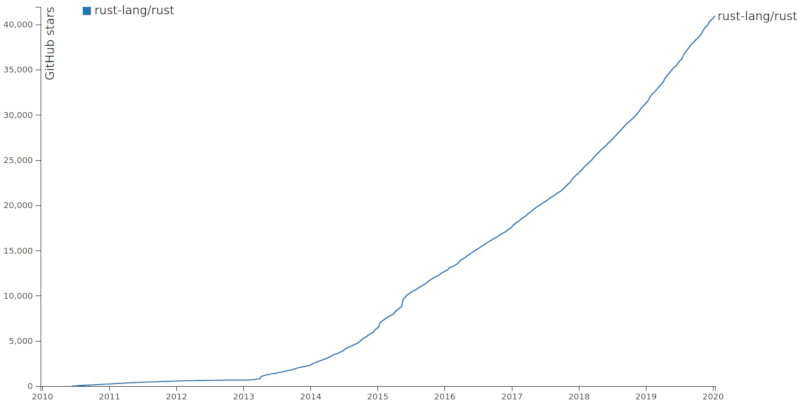39 releases (stable)
| 1.0.30 | Mar 30, 2025 |
|---|---|
| 1.0.26 | Nov 23, 2024 |
| 1.0.22 | Jul 14, 2024 |
| 1.0.21 | Mar 24, 2024 |
| 0.1.6 | Jan 26, 2020 |
#14 in Visualization
583 downloads per month
34KB
711 lines
GitHub star history
Command line program to generate a graph showing number of GitHub stars of a user, org or repo over time.
$ cargo install star-history
Compiler support: requires rustc 1.46+
Screenshot

Usage
We require a token for accessing GitHub's GraphQL API. If you have the GitHub
CLI (gh) installed, you can run gh auth status to find out whether a token
is already set up on your machine, and gh auth login if one isn't.
$ gh auth login
$ star-history dtolnay
$ star-history serde-rs
$ star-history rust-lang/rust
Simply pass multiple arguments to display multiple users or repositories on the same graph.
The generated graphs use D3; the star-history command
should pop open a browser showing your graph. It uses the same mechanism that
cargo doc --open uses so hopefully it works well on various systems.
If you prefer not to use the gh CLI, you can instead provide a token to
star-history through the GITHUB_TOKEN environment variable. Head to
https://github.com/settings/tokens and click "Generate new token (classic)".
The default public access permission is sufficient — you can leave all the
checkboxes empty. Save the generated token somewhere like ~/.githubtoken. Then
export GITHUB_TOKEN=$(cat ~/.githubtoken) prior to running star-history
commands.
License
Licensed under either of Apache License, Version 2.0 or MIT license at your option.Unless you explicitly state otherwise, any contribution intentionally submitted for inclusion in this crate by you, as defined in the Apache-2.0 license, shall be dual licensed as above, without any additional terms or conditions.
Dependencies
~7–19MB
~245K SLoC